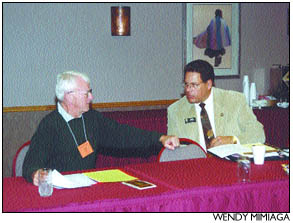|
Jan. 23, 2001
By Janelle Holden Rep. Mark Larson (R-Cortez) has set an ambitious agenda for his second term in the Colorado legislature, pushing bills concerning wildlife, oil- and gas-drilling, rural septic systems and other issues. In an interview with the Journal on Saturday, Larson outlined a variety of bills he plans to sponsor during the 2001 session. On Jan. 31, the Agriculture, Livestock, and Natural Resources committee will hold hearings on Larson’s bill to compensate surface owners for oil- and gas-drilling damages. Currently, the state requires oil and gas operators to post a bond before drilling —with the assumption that a good-faith agreement has been reached between the surface property owner and the developer. H.B. 1062 would require the developer to complete good-faith negotiations with the surface owner before any drilling occurs. The process of negotiations is defined within the bill. "We are recognizing, for the first time, that there is surface damage," said Larson. Larson speculated that the bill had a good chance of passing, but wasn’t as confident of the fate of his predator-control legislation. The predator-control bill would appropriate $500,000 for state predator-control programs. The money would be distributed by the Colorado Department of Agriculture primarily to reimburse or help protect livestock from predators. In 1996, Colorado voters passed Amendment 14, which banned the use of leghold traps and snares to kill coyotes and other predators. Larson said that, if his bill passes, counties would be able to access the fund "but more importantly, we want the agriculture producers who are having to take money out of their own pocket to take care of what the voters decided was a state resource." Larson said there is a good chance the bill will fail because of general-fund budget restrictions. However, his "Plan B" will be to introduce a concurrent resolution to refer out a ballot issue that changes Amendment 14. Larson is also sponsoring a bill to increase funding for the Habitat Partnership Program. The HPP funds projects to help reduce conflicts between wildlife and landowners. Currently, the program is being funded with up to 5 percent of the net sales of big-game licenses, but the bill would require the funding be set at 5 percent. Another of Larson’s proposed bills deals specifically with concerns voiced by the Montezuma County commissioners. He plans to introduce legislation next week to allow county commissioners to issue cease-and-desist orders on septic-treatment projects. Montezuma County has had several problems with septic systems leaking, overflowing, and being inadequate to the subdivisions they serve. Larson also kept those annoyed by telemarketers in mind. If his legislation passes, the state of Colorado would create a no-call list for telephone subscribers who want to avoid solicitation. Currently, the bill is in the Senate. "We’ve already got people in the woodwork — saying there are already ways that you can get on a no-call list, but it’s not state-sanctioned, so therefore it’s not monitored," said Larson. Larson is sponsoring one "housekeeping" item, he said. The 2000 Colorado legislature passed legislation that allowed superintendents to be uncredentialed. Larson’s legislation would remove the need for a "critical evaluator" for superintendents so that school boards could exercise full local control. So far, Larson said he has received the most comments from constituents concerning the apportionment of money required by the passage of Amendment 23. The ballot initiative requires the state to increase education funding by inflation plus 1 percent each year. The amendment stipulated specific school programs the money could be used for. "I have been told that you will see a proportional share of the dollars go to every school," said Larson, but some school officials are concerned that, even if they have met the criteria stipulated by Amendment 23, they will not be given the money. Larson disputed this notion. "Where I am hearing the opposition is, ‘Don’t tell us how to spend the money, send it to us.’ If they’ve met the criteria then the money will go." One of the most contentious issues facing the state in the past two years has been growth management. Larson said he has yet to see the same kind of debate that occurred in the 2000 session, but he thinks it may be the quiet before the storm. Currently, Larson is submitting position papers that support the importance of conservation easements. Kevin Essington, the executive director of the Montezuma Land Conservancy, wrote a letter for Larson explaining the role conservation easements play in retaining open space. Larson is also meeting with the Colorado Land Trust to find out what is already statutorily provided for land trusts. Although the dynamics of the legislature have changed in 2001 — the Democrats are now in the majority in the Senate, and there is less rural representation — Larson said he would continue to evaluate each piece of legislation on its merit. "Being a centrist has worked well for me the past two years. I work off the basis of the merit of the bill," said Larson. |
||
|
Copyright © 2001 the Cortez Journal.
All rights reserved. |
